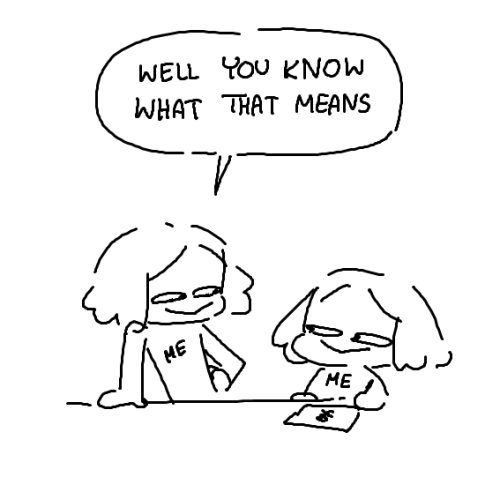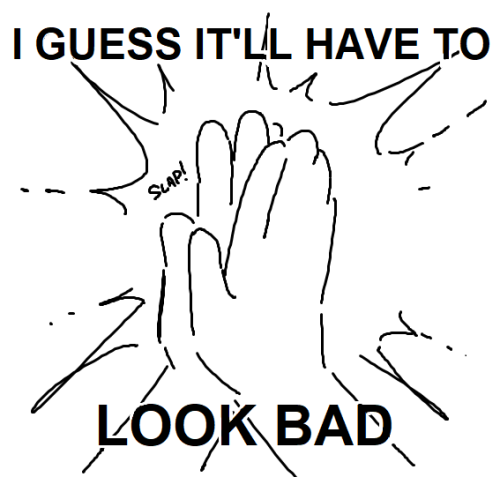Latest Posts by pants-owl - Page 2
this dog is dumb as fuck



I played ButterflySoup2. I’m posting this from heaven.







somewhat of a continuation to my last post, done at school and translated to eng if you cyberbully scottie’s cooking he’ll get sad for a week dont do that

commission
poop
what up tumbur YOU CAN MAKE GIFE

also there’s an important analogy I think needs to be made about clinical diagnoses of mental illness
Does everybody remember that post that was talking about how manatees were removed from the endangered species list, and then it was added that this wasn’t actually because their populations were increasing, it was just that their protections as an endangered species were removed?
It’s like that. Mental illness labels are like endangered species labels. They are both made up, they both describe something real to an extent, but the lines defining them can be very arbitrary. And they conceivably wouldn’t be necessary in a perfect world.
But just like the answer to manatees’ decline isn’t to take them off the endangered species list, the answer to mental health problems isn’t to do away with labels. Because—just like if manatees aren’t endangered anymore, we won’t be closely tracking all their populations and setting up wildlife refuges in important habitats and spending lots of money on educating boaters on how to avoid manatees—if we don’t have some way of “labeling” conditions, people won’t be able to easily access information that might help them and ask for the accommodations they need and connect with other people on the basis of shared experiences.
This goes for neurodivergencies too. It especially goes for them.
I know “autism” is a made up label, and to an extent arbitrary. But—do y’all seriously think the only benefit it’s given me is some kind of “identity” related thing?
Before I started reading online about autism, I did not know what sensory issues were. I had them, but I could not identify them. I knew that I would often be very exhausted after social events and would often become very upset and cry. I knew that sometimes eating was very hard for me, and my nutrition was bad. I knew that I hated going to certain things, but I couldn’t articulate why.
Without the “label,” I could not have described or even found out what was happening to me. As a kid I couldn’t tell you “I don’t like events that are loud” or “I don’t like certain kinds of touch” because I didn’t know that. I just knew that the world was scary and sometimes I felt awful and overwhelmed and there were some patterns but I couldn’t interpret them.
My parents didn’t seek out a diagnosis because of anything related to sensory issues either. I thought things were like this for everyone! I just didn’t know why I had to cry so much and be so irritable.
Like, shit, I’ve had a completely debilitating fear and hatred of doctors and medical procedures my entire life and I could never identify why, and I hurt and traumatized myself further not knowing it was an Autism Thing because I couldn’t communicate my needs or concerns because I genuinely didn’t know what they were. I thought everyone felt like I did! I thought when people joked about going to the doctor being unpleasant, they were referring to things like having recurring nightmares about it and shaking uncontrollably from being in a doctor’s office and feeling panicky from having a nurse move in their peripheral vision.
I hate when people talk about how excessively labeling neurodivergency is somehow stifling or oppressive. I need more words, not fewer. I don’t even necessarily believe that characterizing something as a ‘disorder’ is always bad. “That hurts” is a label and a characterization of something as wrong, and when I’m in pain I don’t want people to create a society for me where it’s okay to be in pain, I want someone to help. Things will still hurt in a world where everyone’s needs and feelings are okay! Sometimes they will hurt in non-normative ways! It’s not possible to completely eliminate the ideas of a “normative” way to experience distress!
Like, I think people have this idea that in a Perfect World, autistic people will be able to be like “yeah, I need quiet environments because I’m very sensitive to noise” and have that accommodated without a “pathologizing” label for it.
But when I was diagnosed and began to do research about my condition, I was able to buy clothes based on my sensory issues. I was able to start wearing earplugs to noisy environments. I was able to plan my activities around what would drain my processing energy and give myself adequate time to recover. I couldn’t have done anything like this before because I didn’t know what was causing me to suffer.
I still feel obviously, painfully Other to most people in social environments. I don’t know if that will ever go away. You can theoretically create a society where accomodations are freely available to everyone without “pathologizing” them, but how do you create a society where no one is Other even if their physical perceptions and entire experience of the world is different? How do you talk about sensory differences without labeling some experiences as different? How do you create a world where it’s okay to be autistic if “autistic” can’t be meaningfully differentiated from anything else?
Defining disability and mental illness based purely on accommodating people without labeling them assumes that people can articulate how they are suffering and what they need without “labeling” vocabulary for it. And I just don’t think that would work as well as people think it would.
Sensory overload doesn’t feel like sensory overload until you know what sensory overload is and how it might apply to you. I know that sounds weird, but it’s true. It feels like coming home from a party and crying and feeling angry, or snapping at people when they try to ask you things, or just feeling nauseated and like your skin wants to crawl off when you’re sitting at the dinner table. Even if you know what sensory overload is, if you’ve never been able to directly and obviously associate your reactions with stimuli, you might not feel it applies.
I’ve struggled so much with my own experience of my body and world and how it’s different from other peoples’ experience and how to explain and identify things I feel and experience. But if I wasn’t able to label myself as autistic, I would not have recognized my suffering as suffering or fully understood that it was “suffering.” I would have just been anxious and exhausted in such a vague, unclear way that it would limit my life, and I feel sick at the thought of a society that would reassure me that it was “okay” to not want to pursue anything outside of my house without giving me words to describe why that was happening.
Sometimes you can’t tell you’re suffering because you’ve never felt anything better. It’s as if people assume there’s this level of feeling okay that everyone will successfully identify as how they could be feeling, and it’s just not true. Sometimes you can’t tell you’re suffering because youre so out of tune with your senses and emotions that you can’t identify something you’re feeling as worse or better than something else, or at least not outside of the immediate moment. Sometimes when you learn about a “label,” that’s the first time you realize, “Wait. Things can be different?”
Idk. I can’t vibe with the ‘labels r bad’ side of mental illness conversation. Labels are always going to be incomplete but they are also always going to be necessary, and they facilitate the process of asking for accommodations. The idea of eliminating “normal” and “abnormal” as categories of experience is appealing until you spend most of your life not knowing “abnormal” existed and just thought “normal” felt bad and difficult.
first art post...... hai im quinn n im a cool artist that draws cool furries ^w^ btww... these r some of my main refs :0



i love burger
mommr


